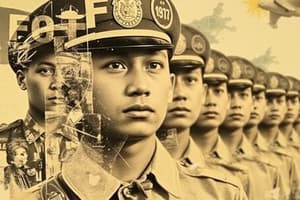Podcast
Questions and Answers
What is the primary aim of the Civic Welfare Training Service (CWTS)?
What is the primary aim of the Civic Welfare Training Service (CWTS)?
- To develop teaching skills for vocational education
- To prepare students for national defense
- To enhance the community's health, education, and welfare (correct)
- To provide military training to students
Which group is primarily targeted by the Literacy Training Service (LTS)?
Which group is primarily targeted by the Literacy Training Service (LTS)?
- Elderly citizens interested in lifelong learning
- College students seeking advanced education
- Military personnel requiring basic education
- Out of school youth and school children (correct)
What is NOT a focus area of the Civic Welfare Training Service?
What is NOT a focus area of the Civic Welfare Training Service?
- Enhancing educational facilities
- Providing military skill training (correct)
- Promoting community recreation
- Improving health and safety
What is the purpose of the Reserve Officers Training Corps (ROTC)?
What is the purpose of the Reserve Officers Training Corps (ROTC)?
Which component of NSTP specifically focuses on literacy and numeracy skills training?
Which component of NSTP specifically focuses on literacy and numeracy skills training?
What was the main purpose of Commonwealth Act No. 1?
What was the main purpose of Commonwealth Act No. 1?
Which president was in office when Commonwealth Act No. 1 was passed?
Which president was in office when Commonwealth Act No. 1 was passed?
What are the three main component programs of the National Service Law (PD 1706)?
What are the three main component programs of the National Service Law (PD 1706)?
What did Presidential Memorandum Order No. 1 do regarding the National Service Law?
What did Presidential Memorandum Order No. 1 do regarding the National Service Law?
What was a requirement for male college students under Commonwealth Act No. 1?
What was a requirement for male college students under Commonwealth Act No. 1?
What significant event in 2001 led to protests against the ROTC program?
What significant event in 2001 led to protests against the ROTC program?
Which act introduced the Expanded ROTC Program?
Which act introduced the Expanded ROTC Program?
What year was the National Training Service Program (NSTP) signed into law?
What year was the National Training Service Program (NSTP) signed into law?
What are the components of the NSTP as established by RA 9163?
What are the components of the NSTP as established by RA 9163?
What was the primary purpose of the NSTP according to its design?
What was the primary purpose of the NSTP according to its design?
Which act did the NSTP amend?
Which act did the NSTP amend?
What was the original ROTC course modified to in 1991?
What was the original ROTC course modified to in 1991?
What significant modification occurred to the ROTC program after the massive protests?
What significant modification occurred to the ROTC program after the massive protests?
Flashcards are hidden until you start studying
Study Notes
History of NSTP: Key Events and Legislation
- The Basic Reserve Officer Training Corps (ROTC) was established as a program effective in the school year 1986-1987.
- Republic Act 7077, enacted in 1991, modified the ROTC program to include an Expanded ROTC Program featuring military subjects in the first year and components like MTS, CWTS, and LES in the second year.
- On March 18, 2001, the body of Mark Welson Chua, a 19-year-old engineering student at UST, was discovered, leading to protests against illegal ROTC practices and a shift from ROTC to the National Training Service Program (NSTP).
NSTP Law (RA 9163)
- Republic Act 9163, signed into law on January 23, 2002, established the NSTP for tertiary-level students.
- The NSTP consists of three components: Civic Welfare Training Service (CWTS), Literacy Training Services (LTS), and Reserve Officer Training Corps (ROTC).
- NSTP aims to foster consciousness and defense preparedness among Filipino youth by promoting ethics of service, nationalism, and patriotism.
Historical Development and Legislation
- Commonwealth Act No. 1, known as the National Defense Act, was passed on December 21, 1935, during President Manuel L. Quezon's administration, intending to create an independent Philippine military.
- This act required male college students to undergo two years (or four semesters) of military training to serve as cadets for national defense.
- Presidential Decree No. 1706, enacted on August 8, 1980, mandated compulsory national service for citizens and consisted of CWTS, Law Enforcement Service (LES), and Military Training Service (MTS), allowing college students to choose among them.
Program Components of NSTP
- Civic Welfare Training Service (CWTS): Aims to improve community welfare by enhancing health, education, environment, safety, and morality.
- Literacy Training Service (LTS): Focuses on developing literacy and numeracy teachers for school children, out-of-school youth, and other societal segments.
- Reserve Officer Training Corps (ROTC): Provides military training to students to motivate and prepare them for national service.
Implementation and Standards
- Following the EDSA Revolution, the implementation of the National Service Law’s military service provisions was suspended by Presidential Memorandum Order No. 1 under President Corazon Aquino.
- The Commission on Higher Education established minimum standards for the NSTP, which includes common and specific modules for effective training.
Recommended Practices
- Emphasis on community-based Disaster Risk Reduction Management (DRRM) integrated into the NSTP curriculum for practical and relevant training.
Studying That Suits You
Use AI to generate personalized quizzes and flashcards to suit your learning preferences.




